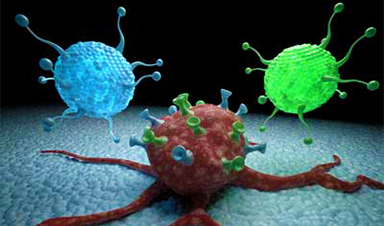Globally, cancer is the second leading cause of death, also because the efficiency of chemotherapeutics is inadequate due to poor delivery to the tumor. NIM scientist Prof Olivia Merkel and her team develop targeted nanocarrier systems to increase the delivery rates of therapeutic formulations and their specific uptake into the target cells.
In the treatment of cancer, there are still several limitations. Especially the delivery of sufficient amounts of active chemotherapeutic drug is difficult. After the conventional intravenous administration, the therapeutic formulation faces some hurdles before reaching the target site. In most cases, the blood circulation time of the active compound is rather short, and a substantial amount of the remaining active drug accumulates in non-target tissues and leads to the known unpleasant and unwanted side-effects in patients.
Therefore, the group of Professor Olivia Merkel focuses on the development of stable and targeted nanocarrier formulations and alternative administration routes. One approach is the targeting of specific sugar receptors expressed on several cancer cells, the mannose and mannose-6-phosphate receptors. The new publication in Advanced Healthcare Materials (“Mannose and Mannose-6-Phosphate Receptor–Targeted Drug Delivery Systems and Their Application in Cancer Therapy”) provides a nice overview of the field and presents first results of a new approach tested in the Merkel Lab.
Image Credit: C Hohmann
News This Week
Scientists Develop Spray-On Powder That Instantly Seals Life-Threatening Wounds
KAIST scientists have created a fast-acting, stable powder hemostat that stops bleeding in one second and could significantly improve survival in combat and emergency medicine. Severe blood loss remains the primary cause of death from [...]
Oceans Are Struggling To Absorb Carbon As Microplastics Flood Their Waters
New research points to an unexpected way plastic pollution may be influencing Earth’s climate system. A recent study suggests that microscopic plastic pollution is reducing the ocean’s capacity to take in carbon dioxide, a [...]
Molecular Manufacturing: The Future of Nanomedicine – New book from Frank Boehm
This book explores the revolutionary potential of atomically precise manufacturing technologies to transform global healthcare, as well as practically every other sector across society. This forward-thinking volume examines how envisaged Factory@Home systems might enable the cost-effective [...]
New Book! NanoMedical Brain/Cloud Interface – Explorations and Implications
New book from Frank Boehm, NanoappsMedical Inc Founder: This book explores the future hypothetical possibility that the cerebral cortex of the human brain might be seamlessly, safely, and securely connected with the Cloud via [...]
Global Health Care Equivalency in the Age of Nanotechnology, Nanomedicine and Artificial Intelligence
A new book by Frank Boehm, NanoappsMedical Inc. Founder. This groundbreaking volume explores the vision of a Global Health Care Equivalency (GHCE) system powered by artificial intelligence and quantum computing technologies, operating on secure [...]
Miller School Researchers Pioneer Nanovanilloid-Based Brain Cooling for Traumatic Injury
A multidisciplinary team at the University of Miami Miller School of Medicine has developed a breakthrough nanodrug platform that may prove beneficial for rapid, targeted therapeutic hypothermia after traumatic brain injury (TBI). Their work, published in ACS [...]
COVID-19 still claims more than 100,000 US lives each year
Centers for Disease Control and Prevention researchers report national estimates of 43.6 million COVID-19-associated illnesses and 101,300 deaths in the US during October 2022 to September 2023, plus 33.0 million illnesses and 100,800 deaths [...]
Nanomedicine in 2026: Experts Predict the Year Ahead
Progress in nanomedicine is almost as fast as the science is small. Over the last year, we've seen an abundance of headlines covering medical R&D at the nanoscale: polymer-coated nanoparticles targeting ovarian cancer, Albumin recruiting nanoparticles for [...]














Leave A Comment